中考 一般过去时课件(共30张PPT)
文档属性
| 名称 | 中考 一般过去时课件(共30张PPT) | 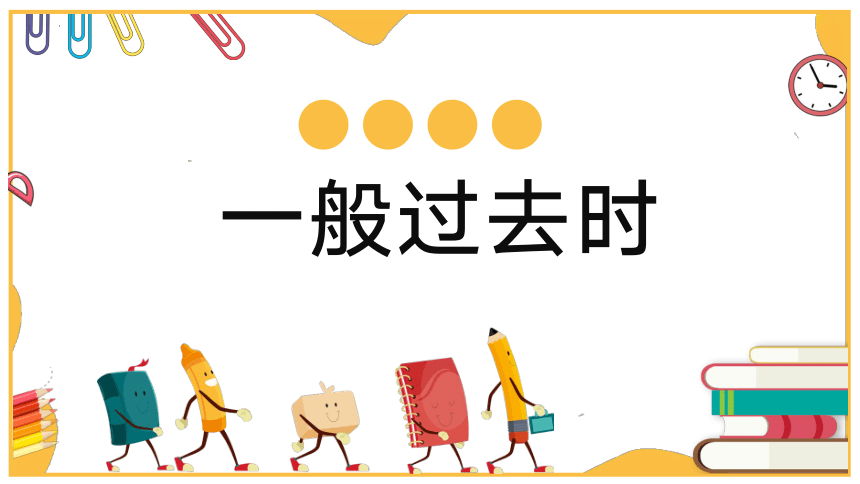 | |
| 格式 | pptx | ||
| 文件大小 | 13.5MB | ||
| 资源类型 | 教案 | ||
| 版本资源 | 人教新目标(Go for it)版 | ||
| 科目 | 英语 | ||
| 更新时间 | 2022-12-17 23:03:03 | ||
图片预览

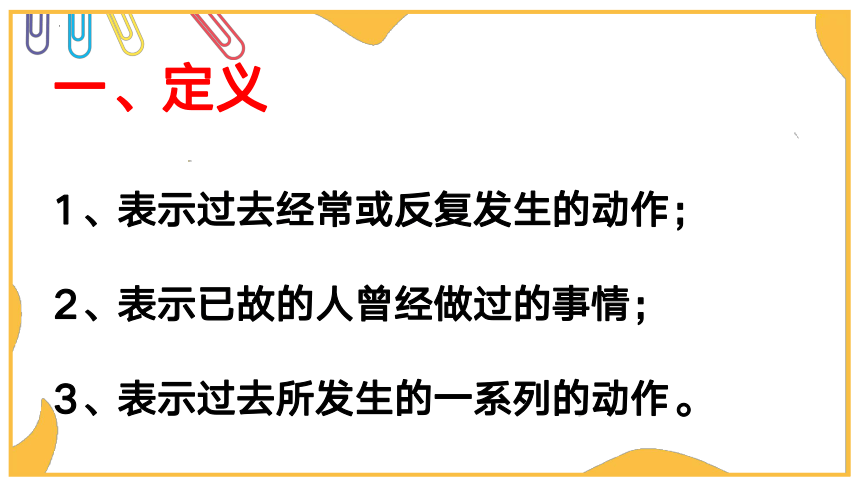
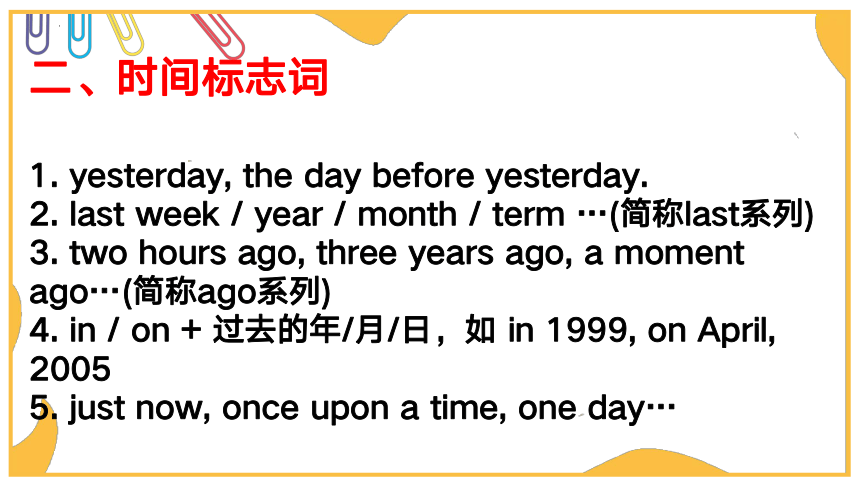
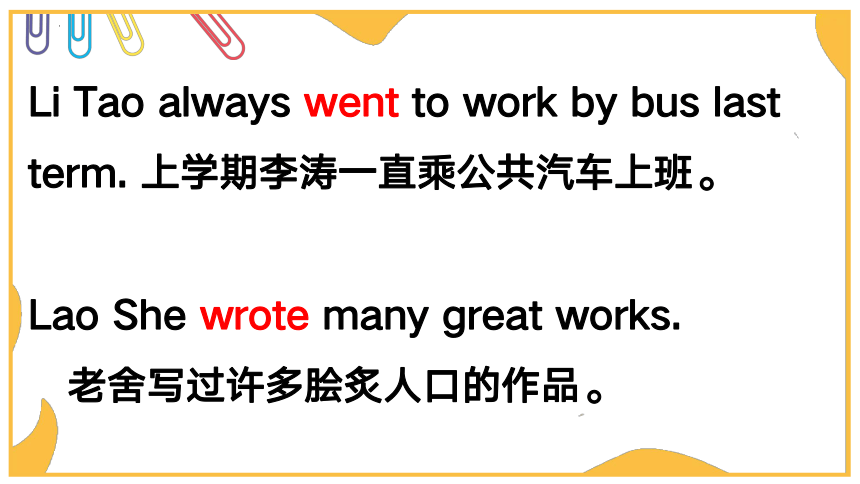
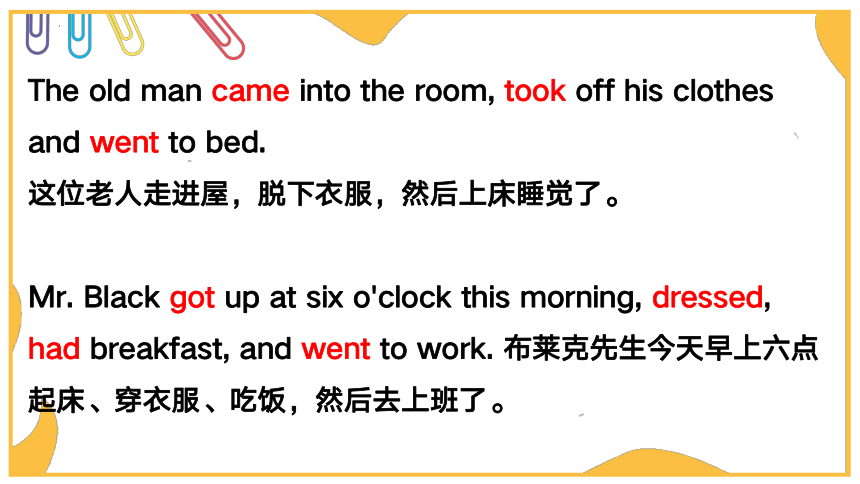
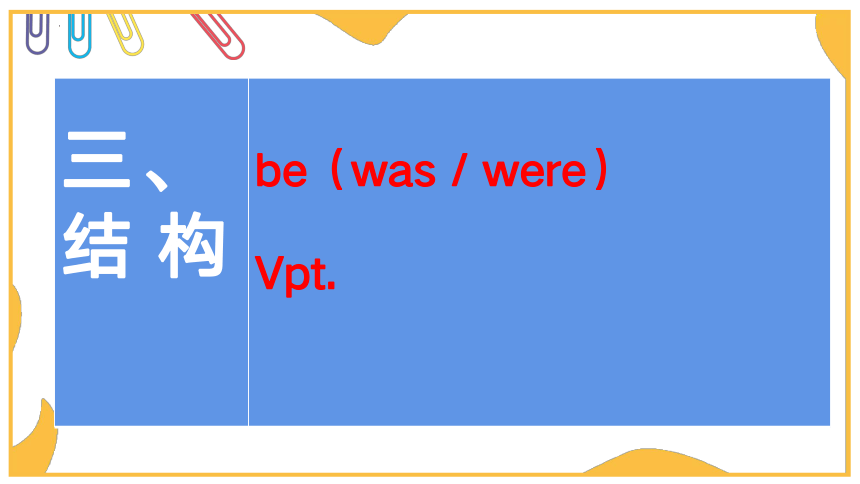
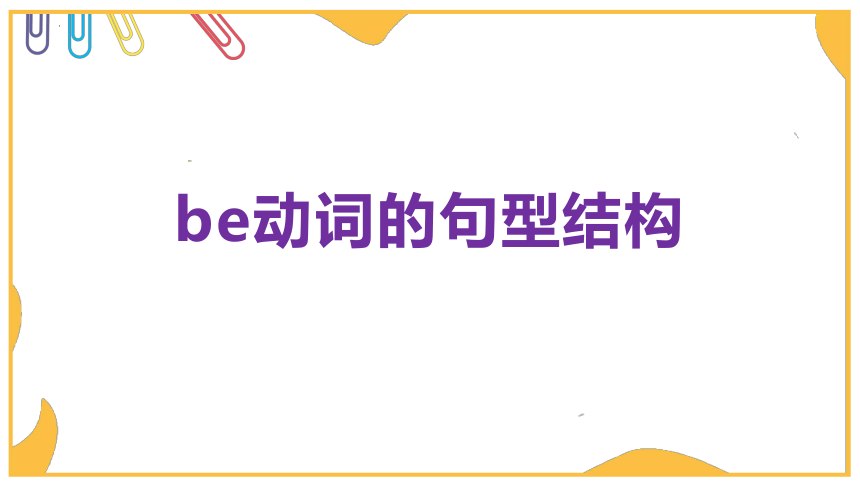
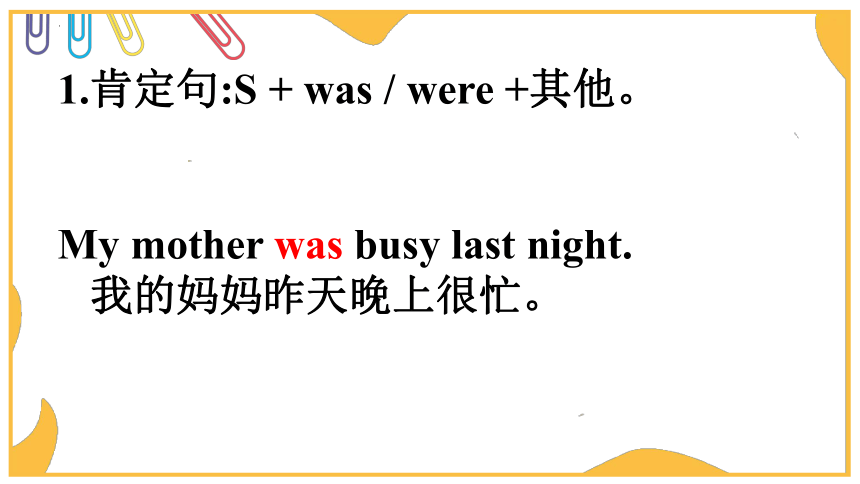
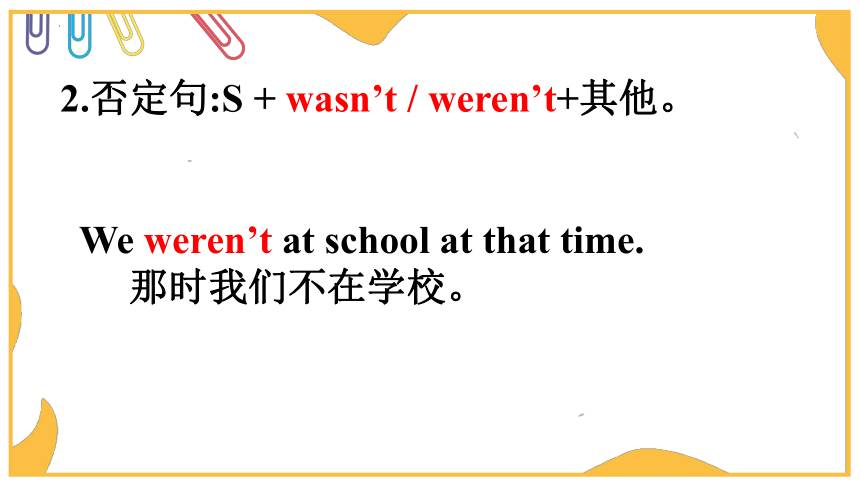
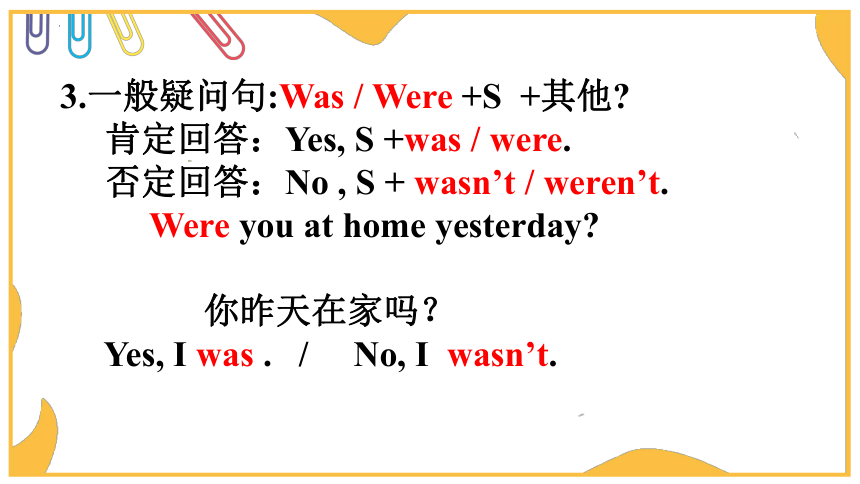
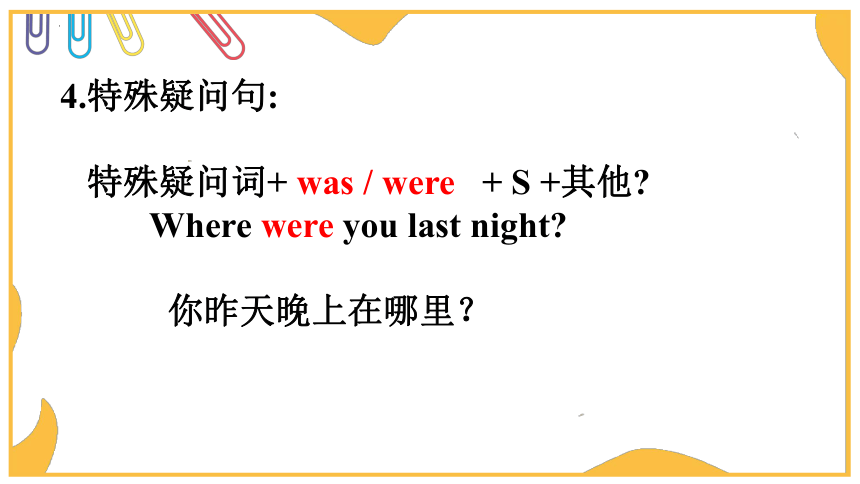
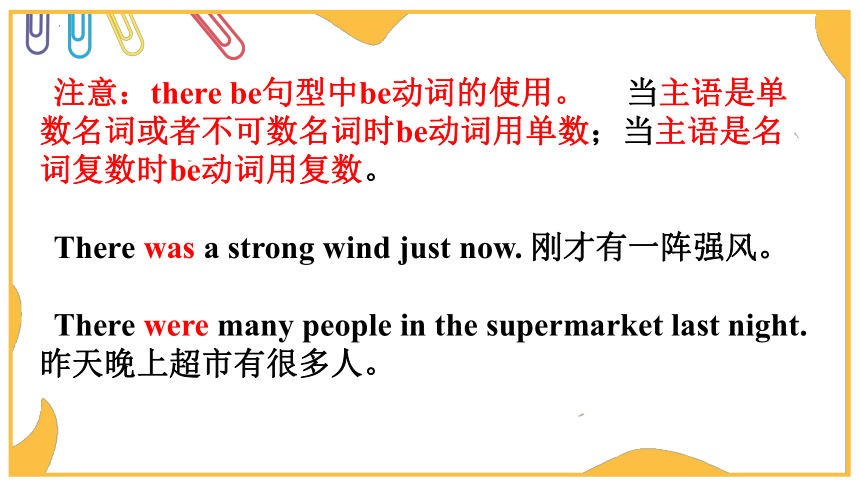
文档简介
(共30张PPT)
一般过去时
一、定义
1、表示过去经常或反复发生的动作;
2、表示已故的人曾经做过的事情;
3、表示过去所发生的一系列的动作。
二、时间标志词
1. yesterday, the day before yesterday.
2. last week / year / month / term …(简称last系列)
3. two hours ago, three years ago, a moment ago…(简称ago系列)
4. in / on + 过去的年/月/日,如 in 1999, on April, 2005
5. just now, once upon a time, one day…
Li Tao always went to work by bus last term. 上学期李涛一直乘公共汽车上班。
Lao She wrote many great works.
老舍写过许多脍炙人口的作品。
The old man came into the room, took off his clothes and went to bed.
这位老人走进屋,脱下衣服,然后上床睡觉了。
Mr. Black got up at six o'clock this morning, dressed, had breakfast, and went to work. 布莱克先生今天早上六点起床、穿衣服、吃饭,然后去上班了。
三、 结 构
be(was / were)
Vpt.
be动词的句型结构
1.肯定句:S + was / were +其他。
My mother was busy last night.
我的妈妈昨天晚上很忙。
2.否定句:S + wasn’t / weren’t+其他。
We weren’t at school at that time.
那时我们不在学校。
3.一般疑问句:Was / Were +S +其他
肯定回答:Yes, S +was / were.
否定回答:No , S + wasn’t / weren’t.
Were you at home yesterday
你昨天在家吗?
Yes, I was . / No, I wasn’t.
4.特殊疑问句:
特殊疑问词+ was / were + S +其他
Where were you last night
你昨天晚上在哪里?
注意:there be句型中be动词的使用。 当主语是单数名词或者不可数名词时be动词用单数;当主语是名词复数时be动词用复数。
There was a strong wind just now. 刚才有一阵强风。
There were many people in the supermarket last night. 昨天晚上超市有很多人。
实义动词的一般过去时
实义动词在一般过去时的
变化规则
1.直接+ed work-worked
look-looked
2.以不发音的e结尾的,直接在e后+d like-liked live-lived
3.以重读闭音节结尾并且词尾只有一个辅音字母的,先双写末尾辅音字母,再+ed stop-stopped
4.以辅音字母+y结尾的,变y为i+ed worry-worried
5.不规则变化 do/does-did go-went
write-wrote see-saw
begin-began have/has-had
实义动词在一般过去时的
句型结构
1.肯定句:S + Vpt +其他。
My mother watched TV last night.
我妈妈昨天晚上看电视了。
注意:
当实义动词在一般过去时变为否定句或疑问句时,需要借助助动词do的过去式did,才能完成句型的转换
2.否定句:S + didn’t + V原+其他。
My mother didn’t watch TV last night.
我妈妈昨天晚上没有看电视。
3.一般疑问句:Did +S + V原 +其他
肯定回答:Yes, S +did.
否定回答:No , S + didn’t.
Did he watch TV last night
他昨晚看电视了吗?
Yes, he did. / No, he didn’t.
是的,他看了。/ 不,他没有看。
4.特殊疑问句:
特殊疑问词+ did + S + V原+其他
What did you do the day before yesterday
前天你们做什么了?
拓展:
常见的特殊疑问词有
人用who,whom;物用what;地点用where;时间用when,what time;原因用why;频率用how often;长度用how long;距离用how far等。
They went there last Sunday. (对划线部分提问)
When did they go there
The boy stayed in Beijing for two years. (对划线部分提问)
How long did the boy stay in Beijing 。
练 习
一、单项选择。
1. My mother ______ an important meeting last night.
A. has B. have C. had D. will have
2. -_______ your sister _______ her homework yesterday -No, she didn’t.
A. Does; does B. Did; do
C. Did; did D. Is; did
3. Your sister _______ her friend last Sunday.
A. isn’t visit B. doesn’t visit
C. didn’t visit D. won’t visit
4. -When ____ you _____ this article - I ______ it last week.
A. will; write; write B. do; write; wrote
C. did; write; wrote D. did; write; write
5. Tommy is looking for the watch his uncle ____ him last month.
A. gives B. gave C. to give D. has given
6. — When ______ you _______ the bike
— Last month.
A. have; bought B. had; bought
C. do; buy D. did; buy
7. — _____ was your vacation
— It was great.
A. Where B. How C. What D. When
8. — ______ did they go last Friday evening
— In the park.
A. Which B. When C. What D. Where
9. — When ______ you come here
— Two years ago. I have been here for two years.
A. do B. will C. did D. have
10. — Hi, Kate. You look tired. What’s the matter
— I ______ well last night.
A. didn’t sleep B. don’t sleep
C. haven’t slept D. won’t sleep
11. I ______ late for the class because I ______ill yesterday.
A. were; were B. am; were
C. am; am D. was; was
12. There ______ a film in the cinema last night.
A. is B. was C. were D. are
13. It ______ cold yesterday, but it ______ warm today.
A. is; is B. was; was C. is; was D. was; is
14. There ______ a ball and two books on the table just now.
A. is B. was C. were D. are
15. Last Sunday my aunt ______ at home with me. We were watching TV all day.
A. was B. were C. is D. are
二、填空题。
A.用be动词的适当形式填空。
1. What ______ the name of your first teacher
2. — ______ his brothers naughty
— Yes, they ______. But they ______ well-behaved now.
3.— Where ______ you last night
— I ______at my grandparents’ home.
4. Where ______ Yao Ming born
5. My parents ______ in Shanghai in 2006.
B.用括号内所给动词的适当形式填空。
1. A girl _______ (cry) for help last night.
2. He _______(point) to the book he wanted.
3. I _______(open) the window after I got up.
4. He knocked on the door and _______(enter).
5. Tom jumped up and _______(rush) to the door.
一般过去时
一、定义
1、表示过去经常或反复发生的动作;
2、表示已故的人曾经做过的事情;
3、表示过去所发生的一系列的动作。
二、时间标志词
1. yesterday, the day before yesterday.
2. last week / year / month / term …(简称last系列)
3. two hours ago, three years ago, a moment ago…(简称ago系列)
4. in / on + 过去的年/月/日,如 in 1999, on April, 2005
5. just now, once upon a time, one day…
Li Tao always went to work by bus last term. 上学期李涛一直乘公共汽车上班。
Lao She wrote many great works.
老舍写过许多脍炙人口的作品。
The old man came into the room, took off his clothes and went to bed.
这位老人走进屋,脱下衣服,然后上床睡觉了。
Mr. Black got up at six o'clock this morning, dressed, had breakfast, and went to work. 布莱克先生今天早上六点起床、穿衣服、吃饭,然后去上班了。
三、 结 构
be(was / were)
Vpt.
be动词的句型结构
1.肯定句:S + was / were +其他。
My mother was busy last night.
我的妈妈昨天晚上很忙。
2.否定句:S + wasn’t / weren’t+其他。
We weren’t at school at that time.
那时我们不在学校。
3.一般疑问句:Was / Were +S +其他
肯定回答:Yes, S +was / were.
否定回答:No , S + wasn’t / weren’t.
Were you at home yesterday
你昨天在家吗?
Yes, I was . / No, I wasn’t.
4.特殊疑问句:
特殊疑问词+ was / were + S +其他
Where were you last night
你昨天晚上在哪里?
注意:there be句型中be动词的使用。 当主语是单数名词或者不可数名词时be动词用单数;当主语是名词复数时be动词用复数。
There was a strong wind just now. 刚才有一阵强风。
There were many people in the supermarket last night. 昨天晚上超市有很多人。
实义动词的一般过去时
实义动词在一般过去时的
变化规则
1.直接+ed work-worked
look-looked
2.以不发音的e结尾的,直接在e后+d like-liked live-lived
3.以重读闭音节结尾并且词尾只有一个辅音字母的,先双写末尾辅音字母,再+ed stop-stopped
4.以辅音字母+y结尾的,变y为i+ed worry-worried
5.不规则变化 do/does-did go-went
write-wrote see-saw
begin-began have/has-had
实义动词在一般过去时的
句型结构
1.肯定句:S + Vpt +其他。
My mother watched TV last night.
我妈妈昨天晚上看电视了。
注意:
当实义动词在一般过去时变为否定句或疑问句时,需要借助助动词do的过去式did,才能完成句型的转换
2.否定句:S + didn’t + V原+其他。
My mother didn’t watch TV last night.
我妈妈昨天晚上没有看电视。
3.一般疑问句:Did +S + V原 +其他
肯定回答:Yes, S +did.
否定回答:No , S + didn’t.
Did he watch TV last night
他昨晚看电视了吗?
Yes, he did. / No, he didn’t.
是的,他看了。/ 不,他没有看。
4.特殊疑问句:
特殊疑问词+ did + S + V原+其他
What did you do the day before yesterday
前天你们做什么了?
拓展:
常见的特殊疑问词有
人用who,whom;物用what;地点用where;时间用when,what time;原因用why;频率用how often;长度用how long;距离用how far等。
They went there last Sunday. (对划线部分提问)
When did they go there
The boy stayed in Beijing for two years. (对划线部分提问)
How long did the boy stay in Beijing 。
练 习
一、单项选择。
1. My mother ______ an important meeting last night.
A. has B. have C. had D. will have
2. -_______ your sister _______ her homework yesterday -No, she didn’t.
A. Does; does B. Did; do
C. Did; did D. Is; did
3. Your sister _______ her friend last Sunday.
A. isn’t visit B. doesn’t visit
C. didn’t visit D. won’t visit
4. -When ____ you _____ this article - I ______ it last week.
A. will; write; write B. do; write; wrote
C. did; write; wrote D. did; write; write
5. Tommy is looking for the watch his uncle ____ him last month.
A. gives B. gave C. to give D. has given
6. — When ______ you _______ the bike
— Last month.
A. have; bought B. had; bought
C. do; buy D. did; buy
7. — _____ was your vacation
— It was great.
A. Where B. How C. What D. When
8. — ______ did they go last Friday evening
— In the park.
A. Which B. When C. What D. Where
9. — When ______ you come here
— Two years ago. I have been here for two years.
A. do B. will C. did D. have
10. — Hi, Kate. You look tired. What’s the matter
— I ______ well last night.
A. didn’t sleep B. don’t sleep
C. haven’t slept D. won’t sleep
11. I ______ late for the class because I ______ill yesterday.
A. were; were B. am; were
C. am; am D. was; was
12. There ______ a film in the cinema last night.
A. is B. was C. were D. are
13. It ______ cold yesterday, but it ______ warm today.
A. is; is B. was; was C. is; was D. was; is
14. There ______ a ball and two books on the table just now.
A. is B. was C. were D. are
15. Last Sunday my aunt ______ at home with me. We were watching TV all day.
A. was B. were C. is D. are
二、填空题。
A.用be动词的适当形式填空。
1. What ______ the name of your first teacher
2. — ______ his brothers naughty
— Yes, they ______. But they ______ well-behaved now.
3.— Where ______ you last night
— I ______at my grandparents’ home.
4. Where ______ Yao Ming born
5. My parents ______ in Shanghai in 2006.
B.用括号内所给动词的适当形式填空。
1. A girl _______ (cry) for help last night.
2. He _______(point) to the book he wanted.
3. I _______(open) the window after I got up.
4. He knocked on the door and _______(enter).
5. Tom jumped up and _______(rush) to the door.
同课章节目录
